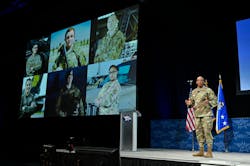Brown Says Airmen Must Be Comfortable With ‘Discomfort’ To Drive Change the Air Force Needs
Already well known for insisting that the U.S. Air Force modernize and “accelerate” to meet today’s evolving security threats, Air Force Chief of Staff Gen. CQ Brown, Jr., March 7, added another requirement during his keynote address at the Air and Space Forces Association 2023 Warfare Symposium.
The service, its Airmen and civilians, he said, need to be “uncomfortable.”
“I'd rather be uncomfortable than lose. That’s exactly why I wrote Accelerate Change or Lose,” Brown told an audience of several thousand Airmen, industry officials, elected officials and Air Force advocates at the symposium, an influential gathering that draws participants from around the world.
“As Airmen, you must think differently about how we fly, fight and win. With accelerate, change, or lose, you need to think about the speed, the agility, the lethality we have that are force multipliers. You must adapt. And we cannot do this by ourselves. … In order to be successful, we have to work together,” he said.
The Air Force must modernize. The Air Force must move quicker, it must accelerate, to adapt and reshape itself to position itself to face the new and emerging threats to the nation’s security and interests. It must balance “capabilities” against “capacity,” which is code for evaluating the Air Force’s strength not simply by the number of aircraft, missiles and personnel but by assessing how the Air Force fits into a wholistic approach braiding together the Joint Force, allies and industry.
In short, Brown emphasized that the service must adapt and reform to ensure that its distinctive history is maintained. “For more than 75 years, when our nation has called, airpower was the answer.” While maintaining that standard is complex and multi-layered, Brown said it could be boiled down to one clear trait. “We need to have credible combat capability. We cannot afford to bluff.”
To get there, Brown announced a new feature of the modernization effort – Air Force Future Operating Concept or AFFOC. This effort, Brown said, “ensures that we are intentionally linked to the Joint Warfighting Concept to execute our Core Functions to create opportunities for the Joint Force. Without the integrated capabilities provided by our Air Force and our Airmen, Joint Force opportunities will be infrequent and costly.”
As part of the over-arching push to reshape and modernize, Brown identified “six fights” that the Air Force now and in the future must dominate “to deter conflict and project airpower in defense of our allies, partners, and national interests. They are fight to compete and deter; fight to get into theater; fight to get airborne; fight for air superiority; fight to deny adversary objectives; and fight to sustain the fight.
And as before, Brown was blunt about the stakes and the need to succeed.
“As Airmen, we must think differently about what it means to fly, fight, and win. Because we know that our speed, agility, and lethality are exponential force multipliers to any global military operation. … Only through collaboration within and throughout will we succeed. We succeed through our teamwork with the joint force, allies and partners, and collaboration across the defense ecosystem. Allowing us to achieve the right mix of capabilities and capacity to ensure a prosperous future.”
While remarks delivered by Brown and other senior Air Force leaders at the AFA’s semi-annual conference are always closely scrutinized, their comments this year carried additional weight because they came a week before the budget proposal for fiscal 2024 is scheduled for release. The budget, like the AFA remarks, give clues for the priorities and focus for the coming year.
Brown offered some clear indications, with most building on, as expected, his operating blueprint known as Accelerate, Change or Lose and the seven “Operational Imperatives” authored by Department of the Air Force Secretary Frank Kendall.
“We are bringing on the F-35 to be the cornerstone of our fighter fleet. … We’re bringing on the Next Generation of Air Dominance family of systems,” he said.
He mentioned that the service is updating munitions, such as the Joint Advanced Tactical Missile.
He pointed out that the development of the service’s newest bomber as well, the B-21 Raider, along with the similar development of the Sentinel ballistic missile, provides a critical update to the nuclear deterrent. These steps, he said, “ensure we can maintain two legs of the triad” that fall under the Air Force’s control. “For global strike, airpower is the answer.”
Brown used a poker analogy to explain the upgrades and doctrine, quoting Gen. George Kenney, who commanded Allied Air Forces in the Pacific from 1942 until 1954.According to Kenny, “Airpower is like poker: A second-best hand is like none at all – it will cost you dough and win you nothing.”
“He was right,” Brown said. “We can’t afford to lose, and we can’t bluff our way into deterrence.”
Brown also highlighted another of his key points – the need to balance capabilities and capacity. In foreshadowing the upcoming budget request, Brown said it is designed to allow the Air Force to buy aircraft at the right rate to ensure “capabilities and capacity” are matched to present-day and future threats.
“We are accelerating change across the Air Force’s Core Functions to develop the capability and capacity mix required to deter, and if necessary, to prevail,” he said.
Brown closed with a refrain he has been emphasizing since becoming the Air Force’s highest-ranking military officer – that even with the most sophisticated technology and practices, it is the drive and quality, innovation and dedication of the Total Force that makes the difference.
“Our Airmen, joint teammates, industry partners, and our allies and partners all need to work together to make sure we get to the right answer,” he said. “In order to execute to a high standard, you can’t play for second place. You need to play to win.”
